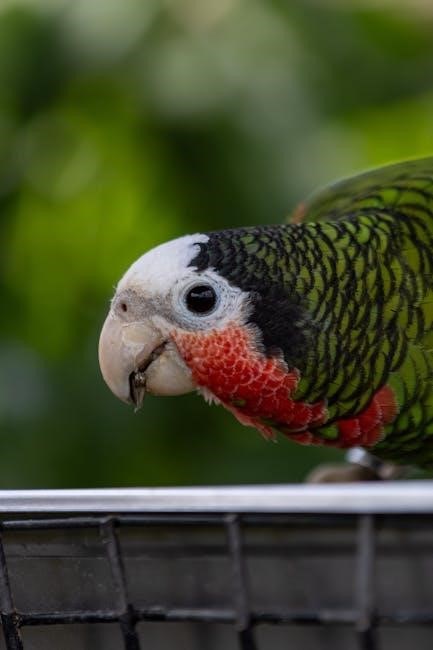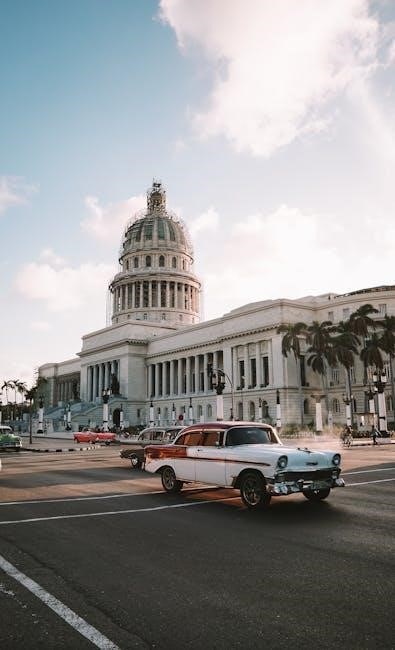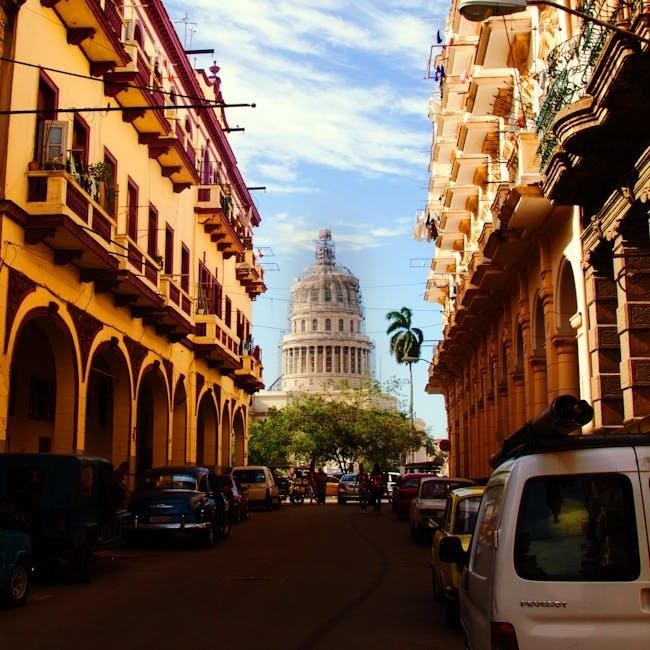
Importing products to Cuba involves understanding complex regulations, licensing requirements, and customs procedures. Cuban authorities strictly monitor imports due to economic sanctions and limited resources. Proper documentation and compliance are essential to ensure smooth transactions and avoid delays.
Overview of Cuba’s Import Regulations
Cuba’s import regulations are stringent, requiring adherence to government-controlled measures. All imports must comply with customs procedures and obtain necessary permits. Sanctions, particularly from the U.S., restrict certain goods. Cuban authorities scrutinize imports to ensure alignment with national interests and economic plans. Documentation, including commercial invoices and certificates, must be precise. Prohibited items are severely restricted, and violations incur penalties. Understanding these rules is vital for successful import operations.
Key Considerations for Importers
Importers must navigate Cuba’s complex regulatory landscape, ensuring compliance with legal requirements. Sanctions, limited infrastructure, and currency restrictions pose challenges. Proper documentation and adherence to customs procedures are critical. Due diligence on suppliers and partners is essential. Understanding restricted and permitted goods is vital to avoid seizures or penalties. Importers should also consider logistics challenges and potential delays in clearing goods through Cuban authorities.
Permitted Products for Import to Cuba
Cuba allows imports of food, agricultural products, machinery, medical supplies, and electronics. These goods must meet regulatory standards and require proper documentation to ensure compliance with import laws.
Food and Agricultural Products
Food and agricultural products are critical imports for Cuba, addressing shortages and supporting the population. Permitted items include grains, poultry, dairy products, fruits, and vegetables. Importers must ensure compliance with phytosanitary regulations and obtain necessary certifications. Agricultural machinery and fertilizers are also allowed to boost local production. All imports require customs clearance and adherence to strict quality standards to ensure safety and sustainability for domestic consumption.
Machinery and Industrial Equipment
Machinery and industrial equipment are essential imports for Cuba’s infrastructure development. Permitted items include agricultural machinery, construction equipment, and manufacturing tools. Imports must comply with Cuban regulations and obtain prior approval. Certain industrial equipment may require special licensing due to sanctions or dual-use concerns. Documentation, such as commercial invoices and certificates of origin, is mandatory for customs clearance. These imports aim to support economic growth and improve production capabilities in key sectors.
Electronics and Technology
Electronics and technology products are permitted for import, but they must comply with strict regulations. Items like computers, smartphones, and telecommunications equipment are in demand. However, certain advanced technologies may require special licensing due to sanctions. Importers must provide detailed documentation, including commercial invoices and certificates of origin. Sanctions and restrictions can impact the import of dual-use technologies. These imports play a crucial role in supporting Cuba’s growing tech sector and improving connectivity.
Medical Supplies and Pharmaceuticals
Medical supplies and pharmaceuticals are critical imports to Cuba, addressing shortages in healthcare. Essential items like medicines, surgical equipment, and diagnostic tools are permitted. Importers must comply with strict regulations, including health certifications. Sanctions may restrict certain products, requiring special permits. Detailed documentation, such as invoices and product certifications, is mandatory. These imports are vital for improving healthcare access and supporting public health initiatives in Cuba.
Restricted and Prohibited Products
Certain goods, such as military equipment and advanced technologies, are restricted or prohibited due to sanctions and import bans. Compliance with Cuban laws and regulations is crucial.
Products Subject to Special Licensing
Certain products, such as dual-use goods, chemicals, and advanced technologies, require special licensing to import into Cuba. These items are subject to strict regulations due to national security, public health, and environmental concerns. Importers must obtain prior authorization from Cuban authorities and comply with international sanctions. Proper documentation and adherence to licensing protocols are essential to avoid delays or penalties. Close collaboration with regulatory bodies is crucial for successful importation.
Items Prohibited Due to Sanctions
Certain items are prohibited from being imported into Cuba due to international sanctions, particularly those imposed by the U.S. and other countries. These include military equipment, advanced technologies, and luxury goods. Sanctions aim to restrict access to goods that could support activities deemed contrary to international policies. Importers must ensure compliance with these restrictions to avoid legal consequences and delays in customs processing.

Regulations and Compliance
Importing to Cuba requires strict adherence to regulations, including customs procedures and licensing. Compliance ensures legal entry of goods, avoiding penalties and delays.
Customs Procedures and Documentation
Importing to Cuba requires detailed customs procedures and documentation. A commercial invoice, packing list, and certificate of origin are essential. The mandatory DViajeros form must be completed prior to arrival. Accurate documentation ensures compliance with regulations, avoiding delays or penalties. Cuban authorities strictly verify all imports to enforce trade restrictions and sanctions.
Licensing Requirements for Specific Goods
Specific goods imported to Cuba require special licenses, particularly for restricted or sensitive items. Medical supplies, pharmaceuticals, and certain technologies must obtain prior authorization. U.S. sanctions also mandate additional approvals for some products. Importers must submit detailed applications to Cuban authorities, ensuring compliance with bilateral agreements and regulations. Licensing ensures adherence to national security and public health standards, preventing unauthorized trade activities.

Import Procedures and Best Practices
Adhere to customs procedures, ensure proper documentation, and verify product compliance with Cuban regulations. Detailed invoices and certificates of origin are essential to avoid delays or confiscation.
Step-by-Step Guide to Importing to Cuba
To import products to Cuba, start by researching permitted items and obtaining necessary permits. Prepare detailed documentation, including commercial invoices and certificates of origin. Declare all items accurately to customs, ensuring compliance with health and safety regulations. Pay required tariffs and taxes, and ensure all products meet Cuban standards. Finalize clearance and arrange secure transportation for delivery. Verify all steps comply with Cuban import laws to avoid delays or confiscation.
Handling Tariffs and Taxes
Understanding Cuba’s tariff system is crucial for importers. Most products incur a customs duty ranging from 10% to 30%, with additional taxes applied. Rates vary based on product category, with some essentials like food and medicine receiving lower tariffs. Certain goods, such as medical supplies, may qualify for exemptions. Accurate product classification and proper documentation are essential to avoid additional fees. Consulting with Cuban authorities ensures compliance and minimizes unexpected costs during the import process.

Challenges and Opportunities in Importing to Cuba
Cuba’s import market presents challenges like economic sanctions, limited infrastructure, and bureaucratic hurdles. However, opportunities exist in meeting demand for essential goods, such as food and medicine, fostering growth and trade relationships despite constraints.
Navigating Economic and Political Challenges
Navigating Cuba’s economic and political landscape requires careful planning due to U.S. sanctions and local regulatory complexities. Importers must adhere to strict licensing requirements and understand the impact of limited foreign exchange and infrastructure challenges. Building strong relationships with local authorities and staying informed about policy changes are crucial for overcoming these obstacles and ensuring successful import operations in Cuba’s unique environment.
Identifying Market Opportunities
Despite challenges, Cuba offers opportunities for importers in sectors like food, medicine, and technology. Rising demand for quality goods, coupled with government efforts to diversify the economy, creates openings for foreign products. Importers can capitalize on shortages by supplying essential items, fostering trade relationships, and adapting to local market needs, thereby contributing to Cuba’s economic development and meeting the population’s growing demands.

Required Documentation for Imports
Importers must provide a commercial invoice, certificate of origin, and customs declaration. Additional documents like health certificates may be required for specific products.
Commercial Invoice and Packing List
A commercial invoice must detail the type, quantity, and value of goods. The packing list should include precise descriptions, quantities, and packaging specifics. Both documents must be accurate and comply with Cuban customs regulations. Any discrepancies can lead to delays or rejection of shipments. Ensure all information aligns with the declared goods to facilitate smooth customs processing and avoid penalties.
Certificate of Origin and Other Certifications
A Certificate of Origin is mandatory for all imports to Cuba, verifying the product’s country of origin. Additional certifications, such as health and safety certificates, may be required for specific goods. These documents must be accurately completed and certified by relevant authorities to ensure compliance with Cuban regulations. Proper certification helps avoid customs delays and ensures goods meet quality and safety standards. Certain products may require additional approvals or inspections.

Role of Cuban Authorities in Importation
Cuban authorities, including Customs and the Ministry of Foreign Trade, enforce strict regulations on imports, ensuring compliance with licensing, documentation, and quality standards to control the flow of goods.
Customs and Border Control
Cuban Customs rigorously enforces import regulations, requiring accurate declarations and proper documentation. Travelers must complete the mandatory Declaración de Viajeros form within seven days of arrival. Health screenings and inspections are common due to strict controls on restricted items. Shortages of basic goods have led to heightened scrutiny of imports. Compliance with customs procedures is essential to avoid delays or confiscation of goods. Authorities prioritize national security and economic stability through these measures.
Ministry of Foreign Trade and Investment
The Ministry of Foreign Trade and Investment plays a central role in regulating and promoting Cuba’s international trade. It oversees the issuance of import licenses, negotiates trade agreements, and collaborates with other government agencies to ensure compliance with national policies. The ministry aims to balance economic growth with strategic national interests, prioritizing imports that support domestic production and self-sufficiency while adhering to international sanctions and restrictions.
Impact of Imports on Cuba’s Economy
Imports help address shortages and stimulate economic activities, but sanctions and limited resources pose challenges for sustainable growth.
Stimulating Economic Growth
Imports play a crucial role in stimulating Cuba’s economy by bridging supply gaps and fostering competition. Essential goods, such as food and machinery, help meet domestic demand, while technological imports drive innovation. Increased trade can create jobs and boost productivity, contributing to sustainable development. However, economic sanctions and limited foreign investment pose challenges to maximizing these benefits.
Addressing Shortages and Supply Chain Issues
Imports are vital for addressing Cuba’s chronic shortages of food, medicine, and essential goods. By bringing in critical supplies, imports help stabilize the domestic market and alleviate supply chain disruptions. Proper documentation and compliance with Cuban regulations ensure goods reach their destinations efficiently. However, economic sanctions and infrastructure challenges continue to complicate the process, underscoring the need for strategic import planning and collaboration with authorities.
Export Opportunities from Cuba
Cuba offers unique export opportunities, including cigars, rum, coffee, and nickel. The country is also exploring new markets for its products to diversify its economy and boost trade.
Products Cuba Exports to Other Countries
Cuba exports a variety of products, including cigars, rum, coffee, nickel, and sugar, which are in high demand globally. The country also exports pharmaceuticals and biotechnology products, leveraging its strong healthcare sector. Additionally, Cuba exports agricultural goods like citrus fruits and tobacco, contributing significantly to its economy. These exports play a crucial role in boosting Cuba’s trade relationships and generating revenue.
Building Trade Relationships
Cuba actively builds trade relationships by exporting goods like cigars, rum, and pharmaceuticals, fostering partnerships with global markets. Collaborations with foreign companies enhance economic ties, while mutual agreements promote reciprocal benefits. These relationships attract foreign investment and expertise, strengthening Cuba’s economy and expanding its market reach, despite challenges posed by economic sanctions and limited resources.

Future Trends in Cuba’s Import Industry
Cuba’s import industry is expected to focus on technological advancements and medical imports, driven by economic reforms and global partnerships, while addressing resource shortages and sanctions challenges.
Expected Changes in Import Policies
Cuba’s import policies are anticipated to undergo significant shifts, with potential easing of restrictions on certain goods like medical supplies and technology. Economic reforms and international partnerships may drive these changes, though sanctions remain a critical factor. The government is likely to balance foreign investment opportunities with state-controlled import systems. Streamlining customs procedures and enhancing transparency could also be part of future policy updates to foster economic growth and stability.
Technological Advancements in Trade
Technological advancements are transforming Cuba’s import processes, with digital tools streamlining customs procedures and documentation. The CUBA Studio platform and CLI tools facilitate efficient project management and development. Automation and real-time tracking systems enhance transparency and reduce delays. These innovations are expected to modernize trade operations, improving compliance and efficiency for importers while fostering economic growth and international business opportunities in Cuba.
Importing to Cuba requires careful navigation of regulations, sanctions, and economic challenges. Understanding these dynamics is crucial for successful trade engagement with the island nation.
Final Thoughts on Importing to Cuba
Importing to Cuba requires careful planning and compliance with strict regulations. Understanding the country’s unique economic and political landscape is essential. While challenges like sanctions and limited infrastructure exist, opportunities for trade remain. Importers must stay informed about licensing requirements and customs procedures to navigate this complex market effectively. Adherence to local laws and international agreements is crucial for successful and sustainable trade engagement with Cuba.
Resources for Further Information
For detailed information on importing to Cuba, consult the Cuban Customs website and official government publications. The “Listado de Productos Importables a Cuba” (List of Importable Products to Cuba) PDF provides a comprehensive guide. Additionally, contact the Cuban Ministry of Foreign Trade and Investment or consult the Cuban Embassy/Consulate in your country for specific requirements and procedures. These resources ensure compliance and provide clarity on regulations and restrictions.